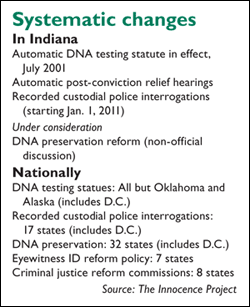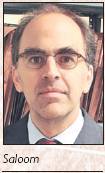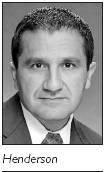Subscriber Benefit
As a subscriber you can listen to articles at work, in the car, or while you work out. Subscribe NowWhen innocent people go to prison, the entire criminal justice system can be thrown under a microscope as advocates, attorneys, judges, and legislators attempt to figure out what went wrong.
Reactions are mixed about how Indiana rates overall in preventing and analyzing those wrongful convictions, and national advocates for wrongful-conviction reforms say Indiana is slightly behind when compared to other states that have implemented reforms in the past decade. But hope can be found as they examine the state’s efforts to strengthen the system and try to prevent these criminal justice mistakes from happening in the first place.

“Indiana appears to be interested in ways to enhance the accuracy of criminal investigations, strengthen prosecutions, and better ensure both justice and public safety,” said Stephen Saloom, an attor ney and policy director for the New York-based non-profit Innocence Project, which studies these issues and advocates for reform nationally. “That’s the positive that we need to look at.”
Of the causes that most often contribute to wrongful convictions eyewitness misidentifications, invalidated or improper forensic science, false confessions or admissions, and bad information from informants or snitches. Indiana has implemented only one of the five key reforms believed to help address those issues.
Nationally, 31 states have enacted DNA preservation statutes while all but Alaska and Oklahoma have adopted automatic DNA testing laws, according to the Innocence Project. Sixteen states have implemented a policy about recording police interrogations, seven states have put eyewitness identification reform policies in place, and eight have established “innocence” commissions to study broad-based criminal justice reforms in these areas.
While Indiana has established a statewide public defender agency to help on cases, and defendants are able to obtain post-conviction hearings that other states sometimes don’t offer, Indiana has adopted only one of those national reforms: an automatic DNA-testing statute, Indiana Code 35-38-7, has been in effect since July 2001.
Discussion has been ongoing about whether Indiana should have a DNA preservation statute, but the Indiana Supreme Court says nothing official is currently being considered on that topic. The court is, however, exploring whether custodial police interrogations should be recorded.
UPDATE: The Indiana Supreme Court issued an order Sept. 15, 2009, adding a new Rule of Evidence requiring that statements obtained during police interrogations must be recorded before they can be entered into evidence in felony cases. Click here to read more.
More than 300 public comments were submitted to the state court’s Committee on Rules of Practice and Procedure during a public comment period that ended
April 30. The court is deciding whether it should adopt a rule requiring that police custodial interrogations in criminal investigations should be recorded and what form that might take. Two prototypes outline possibilities for Indiana Rule 26 of Criminal Procedure on Electronic Recordation, or Indiana Rule of Evidence 1009.
During the last legislative session, Rep. Linda Lawson, D-Hammond, and Sen. Karen Tallian, D-Portage, both pitched the idea, but their bills didn’t make it out of committee. Fiscal impact statements said the Indiana State Police record about half of them already; a law could mean spending to start the process if it’s not already done, but savings could be found in time and costs of pretrial or trial hearings about what happened during a custodial interrogation.
Floyd County Prosecutor Keith Henderson, who is chairman of the ethics committee of the Indiana Prosecuting Attorneys Council, said the requirement would undermine police officers’ work and also jurors’ ability to determine the truth. His comments echo several others submitted by prosecuting attorneys throughout the state.
 On the other hand, Terre Haute defense attorney Jessie Cook argues that the recording should be required because it’s consistent with what other states are doing and it can directly impact a potential wrongful conviction.
On the other hand, Terre Haute defense attorney Jessie Cook argues that the recording should be required because it’s consistent with what other states are doing and it can directly impact a potential wrongful conviction.
“Electronic recording of custodial interrogations minimizes the risk of false confessions and convictions of the innocent, while providing powerful evidence to help convict the guilty,” she commented to the court.
The rules committee is currently considering the issue, and there isn’t a timeline as to when any action must occur. Whatever happens on that reform, though, advocates say they are encouraged the state’s criminal justice system officials are talking about the issues that often result in wrongful convictions.
“We all have to start somewhere, and it’s good that Indiana is having those discussions,” said Marla Sandys, an associate criminal justice professor at I.U. Maurer School of Law – Bloomington, who also sits on a wrongful conviction advisory board in Indianapolis. “Everyone is on the same side (because) no one wants to see innocent people convicted. The question becomes how do we make sure that best happens. That’s the struggle and obstacle, and there are no easy answers.”
Rep. Ralph Foley, R-Martinsville, who sits on the House Judiciary and Courts and Criminal Code committees, said he is also concerned about these issues and doesn’t have a problem with recording police interrogations or other issues that could better help prevent wrongful convictions.
“Wrongful convictions seem to be the unusual exception, and there’s probably more on the other side than those involving wrongful convictions,” he said. “But I came up on the law-and-order side of the system. So it bothers me that we review these in a courtroom laboratory when there may not have been proper training at the front end.”
When asked about the rate of wrongful convictions nationally and how the state focuses on that at the appellate level, Indiana Attorney General Greg Zoeller referred to the high rate of criminal convictions that are affirmed. Zoeller said his office closely follows any legislative or court efforts to more sharply hone the use of forensic evidence in criminal trials. He also works closely with county prosecutors to ensure the system’s fair to both the accused and victims.
“Maintaining public support for the criminal justice system is part of my role as attorney general,” he said. “Our office’s duty is to defend the legal process on appeal, and our success rate in having criminal convictions affirmed is greater than 90 percent.”
 Evidence nationally and statewide that wrongful convictions happen can cast doubt on the overall system, according to Fran Watson, attorney and law professor at Indiana University School of Law — Indianapolis, and others watching these issues. At the Indianapolis law school, the now-freestanding wrongful conviction clinic helps keep an eye on those cases where justice has been wrongly adjudicated and also advocates for prevention. Earlier this year, a 12-person advisory board was also established to help the clinic educate, exonerate, advocate, and communicate about the related issues. The group’s mission is to “elevate practice expertise, knowledge and advocacy to exonerate those who have been wrongfully convicted, and identify the systematic failings that lead us to wrongful convictions.” State and local prosecutors, defense attorneys, private practice lawyers, and criminal justice and forensic science law professors comprise the committee.
Evidence nationally and statewide that wrongful convictions happen can cast doubt on the overall system, according to Fran Watson, attorney and law professor at Indiana University School of Law — Indianapolis, and others watching these issues. At the Indianapolis law school, the now-freestanding wrongful conviction clinic helps keep an eye on those cases where justice has been wrongly adjudicated and also advocates for prevention. Earlier this year, a 12-person advisory board was also established to help the clinic educate, exonerate, advocate, and communicate about the related issues. The group’s mission is to “elevate practice expertise, knowledge and advocacy to exonerate those who have been wrongfully convicted, and identify the systematic failings that lead us to wrongful convictions.” State and local prosecutors, defense attorneys, private practice lawyers, and criminal justice and forensic science law professors comprise the committee.
“We like to think we have more of a presence and identity, and we can have an impact where it counts,” she said. “It’s just about the worst thing to believe someone in prison is innocent and shouldn’t be there to begin with. And while we can talk about reforms all day long, I couldn’t agree more (that) the lawyers have to get it right at the trial level to have the best chance of prevention.”
Please enable JavaScript to view this content.
